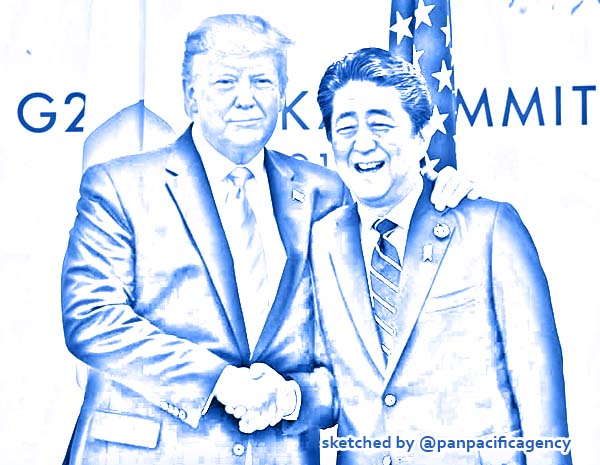Bolton book offers peek into Japan’s PM Abe’s ties with US leader

U.S. President Donald Trump shakes hands with Prime Minister Shinzo Abe during the Group of 20 leaders summit in Osaka on Friday. | REUTERS / VIA KYODO. Sketched by the Pan Pacific Agency.
TOKYO, Jun 23, 2020, The Japan Times. Although the memoir by former top U.S. official John Bolton has been trashed by the White House, and a claim about a $8 billion troop-hosting demand selectively denied by Japan, the book offers a candid portrait of Prime Minister Shinzo Abe’s for-better-or-worse relationship with U.S. President Donald Trump, The Japan Times reported.
In “The Room Where It Happened,” released Tuesday, the hawkish former national security adviser lays bare the apparent trials and tribulations Abe has faced in placating the mercurial American president while also managing to push his own goals — despite occasionally being burned by Trump.
Here’s a look at some of the claims Bolton makes about the Abe-Trump bromance and the larger relationship between the U.S. and Japan:
Mediator with Iran
In one example of how Trump allegedly used his close ties with Abe to his advantage, the U.S. president urged Abe to use his already planned visit to Iran in June 2019 to act as a mediator amid rising tensions between Washington and Tehran — with Trump later revealing that he hadn’t expected the meeting to succeed, according to Bolton.
Although Abe’s attempt at brokering a detente between the U.S. and Iran during the visit would ultimately end in spectacular embarrassment after two oil tankers, including one operated by a Japanese firm, were attacked near the Strait of Hormuz, Bolton claimed that Abe had been set up to fail from the start.
“It was clear to me that Trump was pushing Abe into a public role that could only end in failure,” he wrote, noting that the U.S. president had been “seriously falling asleep” during discussions with Abe on the matter in late May.
According to Bolton, despite the Japanese leader having taken the request “seriously,” Trump had used the unfruitful Iran visit — the first trip to Tehran by a Japanese leader in 41 years — to pivot to his apparent real goal: boosting farm exports to Japan.
“He turned to what was really on his mind, saying he really appreciated the effort, but that it was really much more important to him personally that Japan buy more U.S. farm products,” Bolton wrote.
Trump had long voiced his desire to cut the U.S. trade deficit with Japan, pressing Abe after the Iran failure that the sooner this was done, the better — “like immediately,” Bolton quoted the president as saying.
Just a month later, the two leaders agreed on a bilateral trade deal intended to slash tariffs on farm and industrial products.
Kamikaze dad
In a bid to fend off possible pitfalls in the U.S.-Japan alliance, Abe is widely seen as having worked to cultivate a strong personal bond with Trump.
Bolton wrote that, in his mind, “Trump’s best personal relationship among world leaders was with Abe (golf buddies as well as colleagues), although when Boris Johnson became U.K. Prime Minister, it became a tie.”
Trump, Bolton wrote, is so fond of Abe, that he “loved mentioning that Abe’s father had been a World War II kamikaze pilot” and had used this story “to show how tough the Japanese were generally, and how tough Abe was in particular.”
According to one version, Bolton said: “Trump described Abe’s father as disappointed he hadn’t been able to carry out his intended mission for the Emperor, never seeming to realize that had the father succeeded as a kamikaze, there would have been no Shinzo Abe (born in 1954). Mere historical details.”
North Korea
One area where Bolton said Abe had managed to keep Trump aligned with his own goals, at least initially, was in Tokyo’s backyard: North Korea.
Having plenty of dealings with Pyongyang under his belt, Abe and his lieutenants have cast a skeptical eye toward leader Kim Jong Un’s diplomatic gambit and were pleased to see Trump’s initial hard-line stance on the country’s nuclear ambitions, according to Bolton.
Following what experts believe was the North’s first thermonuclear test in September 2017 and a missile-firing over Japan days later, Abe wrote in a New York Times op-ed that he fully backed the U.S. position that “all options are on the table” — a euphemism widely understood to mean the use of force — a stance that Bolton said was “as close as any Japanese politician can get to saying he could support offensive military operations.”
Though Trump would later meet with Kim after the U.S. leader’s vows of “fire and fury” had blown themselves out, Bolton said Abe and his top advisers had worked hard to persuade Trump “not to give away the store” in terms of concessions.
Ahead of the first Kim-Trump summit, and through their third and final meeting to date, Abe secured important commitments from Trump, according to Bolton.
These included:
- Broaching with Kim the issue of Japanese nationals abducted by North Korean agents during the 1970s and 80s — a commitment Trump “followed through faithfully ” in every encounter with the supreme leader.
- Pressing Trump to advocate not just for the “complete denuclearization” of the North, but also the dismantling of its biological and chemical-weapons programs, “as well as all their ballistic missiles, whatever the ranges.”